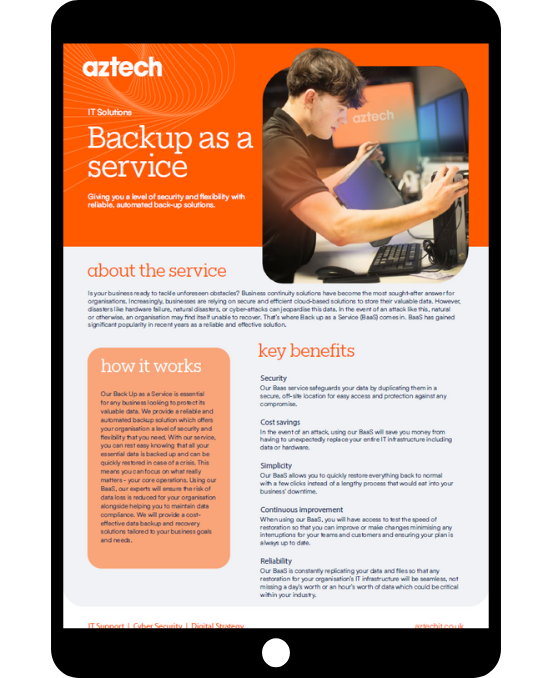We carefully select our technology partners through in-depth research and rigorous testing to ensure they deliver real value to our clients. Backed by top accreditations and ongoing training, we build strong partnerships that keep us skilled, certified and ready to deploy impactful solutions across every sector.
IT Solutions
Backup as a Service (BaaS)
-1.png)
Is your business ready to tackle unforeseen obstacles?
Business continuity solutions have become the most sought-after answer for organisations. Increasingly, businesses are relying on secure and efficient cloud-based solutions to store their valuable data. In today's digital landscape, safeguarding valuable data is vital for business continuity and resilience. Disasters like hardware failure, natural disasters, or cyber-attacks can jeopardise this data. In the event of an attack like this, natural or otherwise, an organisation may find itself unable to recover. Backup as a Service (BaaS) has gained significant popularity in recent years as a reliable indispensable solution for businesses seeking to protect their critical assets.

Our Service
Our Backup as a Service is a reliable and automated backup solution essential for any business looking to protect its valuable data, providing you with the security and flexibility needed to mitigate the risk of data loss effectively.
With our BaaS, you can trust that all your essential data is securely backed up and readily available for quick restoration in the event of a crisis. This allows you to focus on core operations without the worry of potential data loss disrupting your business operations.
Our BaaS experts are dedicated to ensuring the risk of data loss is reduced for your organisation while helping you maintain data compliance with industry regulations.
We understand that every business has unique goals and precise needs, which is why we offer cost-effective data backup and recovery solutions tailored to business specific requirements.
By leveraging our BaaS, you can proactively tackle unforeseen obstacles and ensure business continuity in the face of hardware failures, natural disasters, or cyber-attacks.
Benefits of Backup as a Service (BaaS)
Security
Cost-Savings
Simplicity
Continuous Improvement
Reliability
Scalable Flexibility
Our BaaS solution is designed to accommodate the evolving needs of your organisation. Whether you're a small startup or a large enterprise, our flexible backup services can scale to meet your requirements. Additionally, our BaaS offering can adapt to changes in data volume, types, and storage requirements, providing you with the flexibility to tailor your backup strategy to suit your specific needs.
-1.png)
Flexible Disaster Recovery
Our Backup as a Service (BaaS) offers flexible recovery features tailored to meet diverse recovery time objectives (RTOs) and recovery point objectives (RPOs).
Whether restoring individual files, folders, or entire systems, our solution enables quick data recovery, minimising downtime, and ensuring uninterrupted business continuity in the event of data loss, corruption, or disaster.
With customisable recovery options, you can efficiently restore critical data to meet specific business needs, enhancing operational resilience.
Our Backup as a Service includes robust disaster recovery features, by duplicating your data into its own data centre. Our service ensures redundancy and protection against catastrophic events and guarantee the safety of the Backup as a Service data centre used to store your data, mitigating risks associated with potential disasters affecting the infrastructure.
-1.png)
Regulation Automated Backup
Our Backup as a Service offers a regulatory compliance feature which includes providing extensive reporting and auditing capabilities.
Our BaaS experts ensure your organisation meets all compliance requirements and regulatory mandates while using the service, so that you can maintain full compliance with regulatory standards, enhancing trust and transparency in your operations.
Likewise, our Backup as a Service includes an automated backup feature, streamlining data protection processes. Whether your data resides with on-premise servers, workstations, or cloud environments, our BaaS automatically backs up critical data to secure off-site storage ensuring your data is regularly and consistently backed up without requiring manual intervention and reducing the risk of data loss due to human error or system failures.
With our Backup as a Service, you can confidently protect your critical data while maintaining compliance with regulatory standards, ensuring business continuity and resilience.
-1.png)
Bespoke User Authentication
Our Backup as a Service (BaaS) offers bespoke plans tailored to your business requirements as a feature, so that you can get flexibility and scalability as needed.
We create plans based on your storage capacity needs and can easily adjust as your data requirements evolve over time, ensuring that you always have sufficient capacity to accommodate your growing data needs and enabling seamless scalability and cost-effective management of your backup solution.
In addition to flexible plans, our BaaS includes effective user authentication features to enhance data security so that only authorised personnel can access your most sensitive data. This ensures that your data remains protected against unauthorised access, mitigating the risk of data breaches and ensuring compliance with security regulations.
With our BaaS, you can enjoy peace of mind knowing that your backup solution is tailored to your specific needs, providing both scalability and security to safeguard your critical data assets.
knowledge hub
got a question?
BaaS works by installing agent software on the client's systems or devices that need to be backed up. This software securely transfers data to the service provider's cloud infrastructure, where it is stored and managed according to the client's preferences and requirements.
BaaS supports various types of data, including files, databases, applications, virtual machines, and system images. It can back data from servers, workstations, laptops, and other devices connected to your network or the internet.
Reputable BaaS providers like Aztech have redundancy measures in place to minimise the risk of service interruptions. This includes redundant data centres, failover systems, and 24/7 monitoring to promptly address any issues and ensure continuity of service.

-1.png?width=552&height=678&name=text-image%20module%20desktop%20(4)-1.png)


.png?width=2000&name=Case%20study%20(21).png)


-2.png?width=422&height=591&name=text%20image%20tablet%20(31)-2.png)

-2.png?width=1366&height=768&name=Blog%20Hero%20Banners%20(4)-2.png)
-2.png?width=1366&height=768&name=Blog%20Hero%20Banners%20(5)-2.png)


